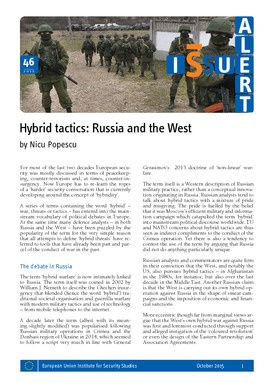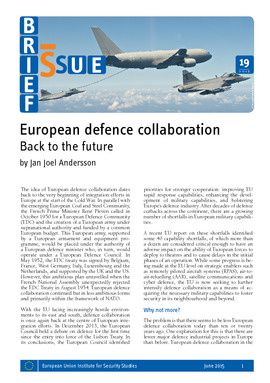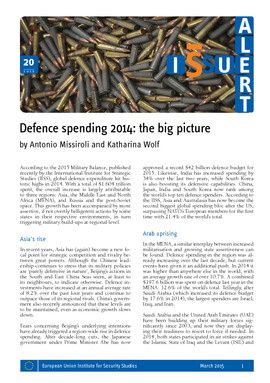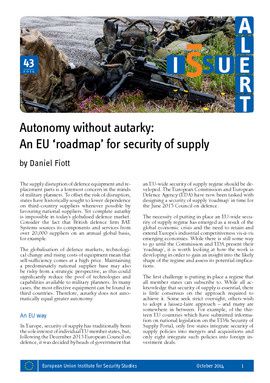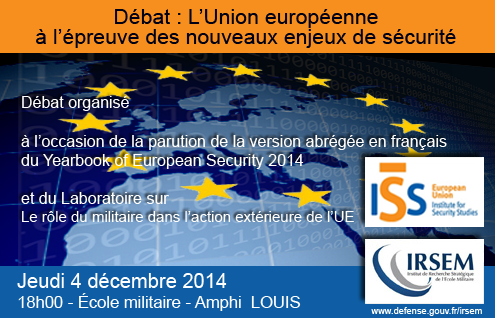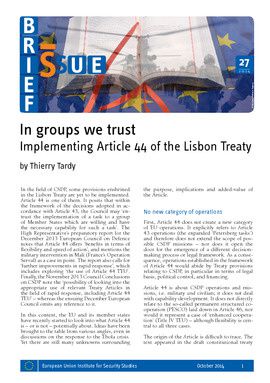15 avril 2016
5
15
/04
/avril
/2016
11:50
14 April 2016 source EUISS
The EUISS – in close cooperation with the Strategic Planning Division of the European External Action Service (EEAS) – has carried out a wide-ranging outreach and consultation process involving the broader expert community represented by think tankers and academics from across Europe (and beyond).
As part of this process, the EUISS asked 50 well-known analysts and commentators – roughly half from inside and half from outside the Union – to give their opinion in less than 1,000 words on the priorities that the forthcoming EU Global Strategy should address and how. The resulting contributions, published daily between 15 January and 31 March are collectively reproduced in this volume and offer a rich selection of independent views intended to nurture the drafting of the strategy.
Download document
15 avril 2016
5
15
/04
/avril
/2016
11:50
13 April 2016 Chaillot Paper - No137 - Jan Joel Andersson, Sven Biscop, Bastian Giegerich, Christian Mölling, Thierry Tardy
This Chaillot Paper – a collective endeavour on which the five authors have collaborated – outlines five possible future scenarios for European defence. The aim is to develop plausible and coherent descriptions of what European defence might look like a decade or two from now in order to point out the choices and decisions that need to be made today.
A key assumption underpinning these hypotheses is that the future of European defence will be of Europeans’ own making rather than the outcome of external pressures and events. Moreover, the publication highlights the fact that, whatever the future evolution of European defence policy, defence cooperation — which could take shape in many different ways — is essential if Europe is to be a global security actor in its own right.
Download document
2 novembre 2015
1
02
/11
/novembre
/2015
12:50
In the Middle East and North Africa (MENA), hybrid warfare differs somewhat from that of state actors like Russia. In this region, it is non-state actors (which often harbour state-like ambitions) that employ hybrid tactics to target governments they deem illegitimate. And, more often than not, their use is determined by resource constraints rather than tactical considerations.
Though hybrid tactics have long been present in the MENA, it was in the summer of 2006 during Hizbullah’s conflict with Israel that they really came to the fore. The Islamic State of Iraq and the Levant (ISIL), which gained notoriety in the summer of 2014 following its rapid expansion, is taking this regional hybrid trend to the next level of territoriality.
Download document
30 octobre 2015
5
30
/10
/octobre
/2015
08:50
For most of the last two decades European security was mostly discussed in terms of peacekeeping, counter-terrorism and, at times, counter-insurgency. Now Europe has to re-learn the ropes of a ‘harder’ security conversation that is currently developing around the concept of ‘hybridity’.
A series of terms containing the word ‘hybrid’ – war, threats or tactics – has entered into the mainstream vocabulary of political debates in Europe. At the same time many defence analysts – in both Russia and the West – have been puzzled by the popularity of the term for the very simple reason that all attempts to define ‘hybrid threats’ have referred to tools that have already been part and parcel of the conduct of war in the past.
Download document
20 septembre 2015
7
20
/09
/septembre
/2015
11:50
The year 2014 was dubbed a ‘game-changer’ for European security. Is 2015 going to be a game-changer for European defence spending? After Germany, the Netherlands, Poland, the Czech Republic, Slovakia, Romania and the Baltic states, France has now announced it is planning to raise national defence spending from 2016 onwards.
The significance of such commitments should not be downplayed. Defence expenditure has been shrinking in Europe for the best part of two decades, and public spending has fallen sharply with the onset of the financial crisis in 2008. The current efforts to boost defence budgets do more than simply buck the trend: they look like they will have a visible effect on real spending over coming years in some key European states. Yet such reports should also not be overblown: what this buys Europe in terms of output is as yet uncertain. In parallel, some European countries have in fact embarked on further cuts. As such, the overall picture as yet far from clear.
Download document
20 septembre 2015
7
20
/09
/septembre
/2015
11:50
Back in 2012, when NATO Secretary-General Anders Fogh Rasmussen said that “there is a price to pay for security, but the cost of insecurity can be much higher,” there were few who fully grasped just how accurate his warning was. For many years, European defence budgets have largely been spiralling downward following decisions which now seem somewhat unwise given the rapid deterioration of Europe’s security environment.
That said, there was arguably little to indicate that heavy investments in the military were necessary, and the financial crisis did its bit, too, to dampen enthusiasm for military spending.
Download document
20 septembre 2015
7
20
/09
/septembre
/2015
11:50
With the EU facing increasingly hostile environments to its east and south, defence collaboration is once again back at the centre of European integration efforts. In December 2013, the European Council held a debate on defence for the first time since the entry into force of the Lisbon Treaty.
In its conclusions, the European Council identified priorities for stronger cooperation: improving EU rapid response capabilities, enhancing the development of military capabilities, and bolstering Europe’s defence industry. After decades of defence cutbacks across the continent, there are a growing number of shortfalls in European military capabilities.
Download document
20 septembre 2015
7
20
/09
/septembre
/2015
11:35
Ever since the release of the 2013 ‘EU-China 2020 Strategic Agenda for Cooperation’, counter-terrorism officially features in bilateral meetings. The section on peace and security, for instance, states the need to ‘hold special consultations on issues of anti-terrorism at an appropriate time’– and talks were indeed held at the October 2014 ASEM meeting. The EU statement released after that summit declared that China and the EU ‘reviewed the situation in the Middle East, northern Africa and the Sahel […] and agreed to increase cooperation to counter the common threat of extremism and terrorism in these regions’.
Despite such statements, however, no concrete roadmap for bilateral cooperation in this area has yet materialised. Although normative differences continue to represent a serious obstacle to greater cooperation, they are not insurmountable given the common
Download document
30 avril 2015
4
30
/04
/avril
/2015
16:50
Produced for the occasion of the EUISS conference with HR/VP Mogherini in April 2015, the leaflet goes back to basics on the EU’s external action.
Infographics and illustrations, as well as a glossary of terms and relevant actors, present facts and figures about the European Union’s Common Foreign and Security Policy (CFSP), as well as its broader external action activities – in an easily accessible manner.
Download document
2 avril 2015
4
02
/04
/avril
/2015
16:50
According to the 2015 Military Balance, published recently by the International Institute for Strategic Studies (IISS), global defence expenditure hit historic highs in 2014. With a total of $1.604 trillion spent, the overall increase is largely attributable to three regions: Asia, the Middle East and North Africa (MENA), and Russia and the post-Soviet space.
This growth has been accompanied by more assertive, if not overtly belligerent actions by some states in their respective environments, in turn triggering military build-ups at regional level.
Download document
21 mars 2015
6
21
/03
/mars
/2015
12:50
A variety of new political and security challenges seem to be emerging in the Arctic, including military developments which are particularly worrying at a time of heightened tension between Russia and the West.
Yet these signs of a resurgent geopolitical rivalry are matched by equally strong incentives for continuing cooperation across the polar region.
Download document
21 mars 2015
6
21
/03
/mars
/2015
12:35
Chinese President Xi Jinping’s ongoing anti-corruption drive has, so far, targeted 16 high-ranking military officers, as well as thousands of civil servants. The attention paid to the People’s Liberation Army (PLA) by the president ever since he became Chairman of the Central Military Commission in 2012 highlights the PLA’s importance as a political actor in its own right.
However, China also has an effective system of civilian control over the military, which works, unlike in the West, not because the armed forces are deemed to be apolitical, but, on the contrary, because they are thoroughly politicised.
Download document
30 janvier 2015
5
30
/01
/janvier
/2015
11:30
Jihadist militants have long operated in the pockets of instability which stretch from Bamako to Bagdad. However, they have also been making the most of governance problems in the world’s biggest open space: the internet.
Forced to confront this fact, the governments of France, the UK and the US, among others, have already announced their intention to reinforce the powers of their intelligence agencies and strengthen cooperation with the private sector in a joint effort to spot and eradicate online extremist safe havens.
Download document
23 novembre 2014
7
23
/11
/novembre
/2014
12:50
Das EUISS Yearbook of European Security (YES) 2014 stellt als jährliche Publikation des Instituts Schlüsseldokumente und -daten der Gemeinsamen Außen- und Sicherheitspolitik (GASP) und der Gemeinsamen Sicherheits- und Verteidigungspolitik (GSVP) der EU zusammen. Die gekürzte Ausgabe auf Deutsch widmet sich auch der Entwicklung europäischer Verteidigungshaushalte. Optisch ansprechende Karten, Diagramme und Tabellen bieten zusätzliche Klarheit bezüglich zentraler aktueller Herausforderungen der Europäischen Union und ihres externen Handelns.
YES ist eine unverzichtbare Veröffentlichung, die darauf abzielt, Experten, Akademiker, Praktiker und generell all jene, die mehr über die EU und sicherheitsrelevante Belange wissen möchten, durch innovative, evidenzbasierte Analyse und die Darstellung wesentlicher Fakten und Zahlen zu informieren.
Download document
23 novembre 2014
7
23
/11
/novembre
/2014
12:30
Islamism today has many faces: militant groups in Iraq and Lebanon, political parties in Tunisia and Egypt, and regimes in Iran and Saudi Arabia. But this umbrella term conceals the fact that these groups use different tactics, tap into different grievances and have different political goals. Lumping them together is a gross oversimplification – it is time for an overview.
Although often associated with terrorist groups, the term Islamism simply denotes a political project inspired by Islam. Current streams of political Islam all belong to a wave of Islamist revivalism, the likes of which was last seen on several occasions between the 11th and 14th centuries. Their goal is the re-Islamisation of their respective societies, and ultimately a state based on the principles of Islam. The three major currents belonging to this wave, however, differ starkly on religious doctrine, on what kind of state to establish, and how to fulfil their objectives. In contrast to adherents of authoritarian Islamism, who believe they have already accomplished the goal of creating an Islamic state, advocates of both revolutionary and electoral Islamism are ‘changists’, seeking to replace incumbent regimes. The latter two disagree, however, on the means to bring about the desired change, as well as on the form of the Islamic state to be achieved.
Download document
22 novembre 2014
6
22
/11
/novembre
/2014
12:50
Download document
The potential security challenges linked to climate change can make for great headlines. While sensationalist claims about water wars, states collapsing in chaos or the forced migration of hundreds of millions cannot be completely discounted for the long term, intelligent mitigation and adaptation efforts can help avoid the worst of these – and manage the rest.
Planning these efforts, however, requires that the likelihood and time frame of climate change impacts are well understood (as much as they can be); that security challenges associated with these impacts are placed in their proper context; and that resilience mechanisms, including security and defence systems, are appropriately organised to withstand potential shocks. And while much analysis is necessarily focused on potential climate-related threats abroad – climactic stressors that can change the calculus of potential conflicts in far-off lands – climate change will also impact security and defence considerations closer to home.
22 novembre 2014
6
22
/11
/novembre
/2014
12:20
The US is determined to remain the world leader in defence technology. After several years of procurement and research cuts (a 14% reduction to $168 billion in fiscal year 2013 and a further 4% to $162 billion in 2014), the US is now planning to stabilise spending levels in this field. To ensure that it stays ahead in the technology game even in times of tighter budgets, the Pentagon will shift more money to basic research and early stage developments – the level where concepts are turned into prototypes.
The trade-off is that the budget for system development and demonstration is being reduced, meaning that many promising new technologies may never materialise or enter production. Meanwhile, the US will continue producing systems of incrementally improved levels of technology so as to ensure that its military keeps its edge until new breakthrough technology can be fielded.
Download document
21 novembre 2014
5
21
/11
/novembre
/2014
17:50
The disruption of the defence supply chain and the inability to replace or reproduce equipment: a nightmarish prospect for any military planner. To allay such fears, states have, whenever possible, sought to lower dependence on third-country suppliers by favouring national industry. Yet complete autarky is impossible to achieve in today’s globalised defence market. Consider, for example, the fact that British defence firm BAE Systems sources its components and services from over 20,000 suppliers across the world on an annual basis.
The globalisation of defence markets, technological change and rising costs of equipment mean that self-sufficiency comes at a high price. Maintaining a predominately national supplier base may also be risky from a strategic perspective, as this could significantly reduce the pool of technologies and capabilities available to military planners. In many cases, the most effective equipment can be found in third countries. Therefore, autarky does not automatically equal greater autonomy.
Download document
21 novembre 2014
5
21
/11
/novembre
/2014
17:20
Without much fanfare, the Heavy Airlift Wing of the independent multinational Strategic Airlift Capability (SAC) Programme turned five years old in the autumn of 2014. There was a low-key ‘birthday celebration’ on 29 August last which did not attract much media attention.
But the truth is that the Heavy Airlift Wing is a rare and remarkable achievement of pooling and sharing that has delivered tangible and new operational military capability in Europe. As such, the Heavy Airlift Wing demonstrates that not only can multinational pooling and sharing work – but that it is also a smart way of jointly procuring and owning new capabilities for countries too small to do it alone.
Download document
21 novembre 2014
5
21
/11
/novembre
/2014
13:45
Earlier this month, extremist group Boko Haram occupied new chunks of territory in northeastern Nigeria, including the town of Chibok – widely known because of the media attention it received following the #BringBackOurGirls campaign last spring. Although Nigeria’s military recaptured the town a few days later with the help of local armed groups, swathes of northern Nigeria remain unstable at best. Suicide-bomb attacks have claimed dozens of victims in Azar, while people in Maiduguri, where schools are now reopening following eight months of closure, fear that their city is still under threat.
The situation is worsening as the 2015 national elections approach: over 200 schoolgirls kidnapped from Chibok are still missing, and speculations about a recent botched deal with Boko Haram mediated by Chad have undermined, once again, Nigerian President Goodluck Jonathan’s authority and credibility.
Download document
19 novembre 2014
3
19
/11
/novembre
/2014
08:55
18/11/2014 EUISS - IRSEM
L’Institut d’Etudes de Sécurité (EUISS) et L’Institut de Recherche Stratégique de l’Ecole militaire (IRSEM) organisent un débat à l’occasion de la parution de la version abrégée en français du Yearbook of European Security 2014 (EUISS) et du Paris paper «Le rôle du militaire dans l’action extérieure de l’UE» (IRSEM).
Ce débat intitulé ‘L’Union européenne à l’épreuve des nouveaux enjeux de sécurité’ se tiendra le jeudi 4 décembre 2014 à l’Amphithéâtre Louis de l’École Militaire.
Vous pourrez accéder aux détails du programme en cliquant sur le lien ci-joint :
Programme
Merci de bien vouloir vous enregistrer en ligne ci-dessous :
ENREGISTREMENT EN LIGNE
17 novembre 2014
1
17
/11
/novembre
/2014
08:50
14/11/2014 IRSEM
L’Institut d’Etudes de Sécurité (EUISS) et L’Institut de Recherche Stratégique de l’Ecole militaire (IRSEM) organisent un débat à l’occasion de la parution de la version abrégée en français du Yearbook of European Security 2014 (EUISS) et du Paris paper «Le rôle du militaire dans l’action extérieure de l’UE» (IRSEM).
Ce débat intitulé ‘L’Union européenne à l’épreuve des nouveaux enjeux de sécurité’ se tiendra le jeudi 4 décembre 2014 à l’Amphithéâtre Louis de l’École Militaire.
Vous pourrez accéder aux détails du programme en cliquant sur le lien ci-joint :
Programme
Merci de bien vouloir vous enregistrer en ligne ci-dessous :
ENREGISTREMENT EN LIGNE
4 novembre 2014
2
04
/11
/novembre
/2014
17:45
One of the priorities of the 2014 EU Chairmanship of the Contact Group on Piracy off the Coast of Somalia (CGPCS) has been to adequately document the lessons learned from the Contact Group. This includes both the unfiltered accounts of people affected by piracy or involved in the fight against piracy and the more academic, analytical work whose aim is to generate conclusions, observations and recommendations. To achieve the objective of documenting the CGPCS lessons learned, a CGPCS Lessons Learned Consortium was established in 2013 consisting of the EU Institute for Security Studies (EUISS), Cardiff University and Oceans Beyond Piracy. These three organisations have initiated and developed several work strands to ensure that the lessons learned from the Contact Group are not only preserved for future students, scholars and practitioners, but also placed in a broader societal and intellectual framework, allowing for further analysis and study.
This report is one of the core products of the CGPCS Lessons Learned Project. The EUISS has brought together a number of authors who have been involved in the CGPCS from the outset to document the genesis and evolution of the Contact Group since its inception in 2009. These contributions offer an overview of the work of the Contact Group and illustrate the road the CGPCS stakeholders have travelled together as well as the manner in which the international counter-piracy strategy has evolved.
Download document
10 octobre 2014
5
10
/10
/octobre
/2014
16:50
A decade ago the EU launched the European Neighbourhood Policy (ENP) in an attempt to surround itself with a ‘ring of friends’. As the Economist put it recently, however, it now seems surrounded by a ‘ring of fire’. As the EU begins to reassess and adjust its policies towards its neighbours, it is necessary to examine what went wrong, and equally important to avoid false diagnoses, in particular about what sparked the conflict in Ukraine.
It was long thought that Russia was hostile to NATO but not the EU. This has proven to be false: the current crisis in Ukraine is a result of Russian opposition to the European Union, not just the transatlantic military alliance. Moscow perceives any steps towards economic integration with the EU as a threat to its broader geopolitical goals, and is bent on proving that European integration will damage post-Soviet states, irrespective of whether they wish to join NATO or not. Moldova is a neutral state which never pursued NATO membership, yet it faced constant Russian pressure. Under President Yanukovich, Ukraine abandoned its NATO accession plans: yet it continued to be a target of Russian coercion efforts in the trade and energy spheres.
Download document
7 octobre 2014
2
07
/10
/octobre
/2014
16:50
In the field of CSDP, some provisions enshrined in the Lisbon Treaty are yet to be implemented. Article 44 is one of them. It posits that within the framework of the decisions adopted in accordance with Article 43, the Council may ‘entrust the implementation of a task to a group of Member States which are willing and have the necessary capability for such a task’.
In this context, the EU and its member states have recently started to look into what Article 44 is – or is not – potentially about. Ideas have been brought to the table from various angles, even in discussions on the response to the Ebola crisis. Yet there are still many unknowns surrounding the purpose, implications and added-value of the Article.
Download document







